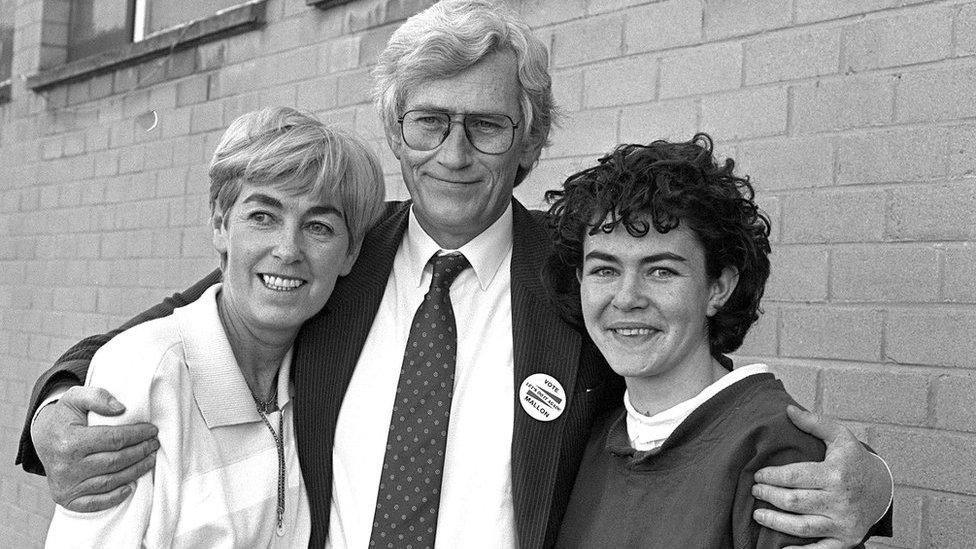Seamus Mallon, former deputy leader of the SDLP, dies aged 83
- Published
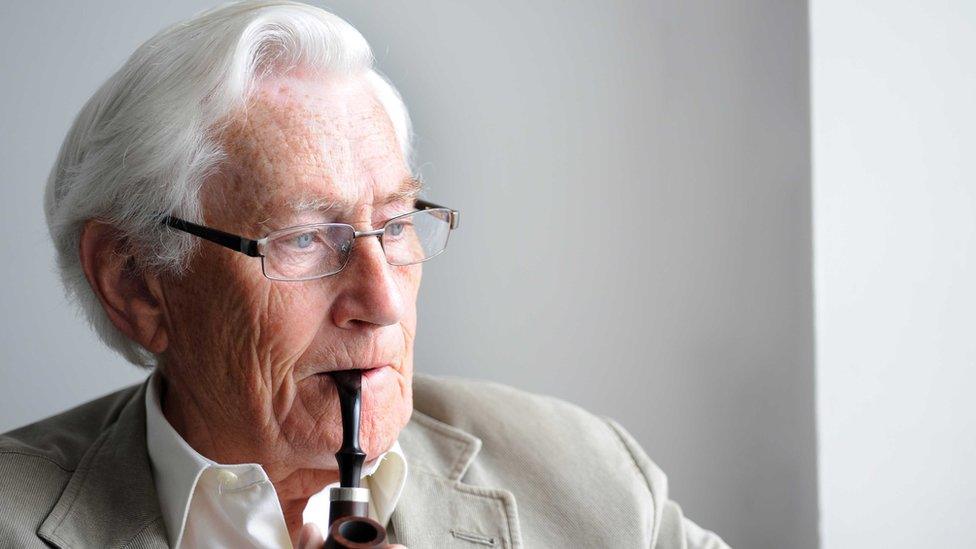
Political figures have been paying tribute to Mr Mallon who died on Friday
Former SDLP deputy leader Seamus Mallon has died aged 83.
Mr Mallon, who was one of the key architects of the Good Friday Agreement, served as deputy first minister of Northern Ireland from 1998 to 2001.
Born in Markethill, County Armagh, he was heavily involved in the civil rights movement in Northern Ireland.
He served as deputy leader of the SDLP from 1979 to 2001 and MP for Newry and Armagh from 1986 to 2005.
It is understood he had been suffering from an illness for some time.
A book of condolence will open at Belfast City Hall at 14:00 GMT on Saturday.
Mr Mallon was deputy first minister when Ulster Unionist leader David Trimble was first minister and although they were dubbed a political "odd couple", the pair were united against violence.
In March 1998, they jointly visited the families of two murdered friends.
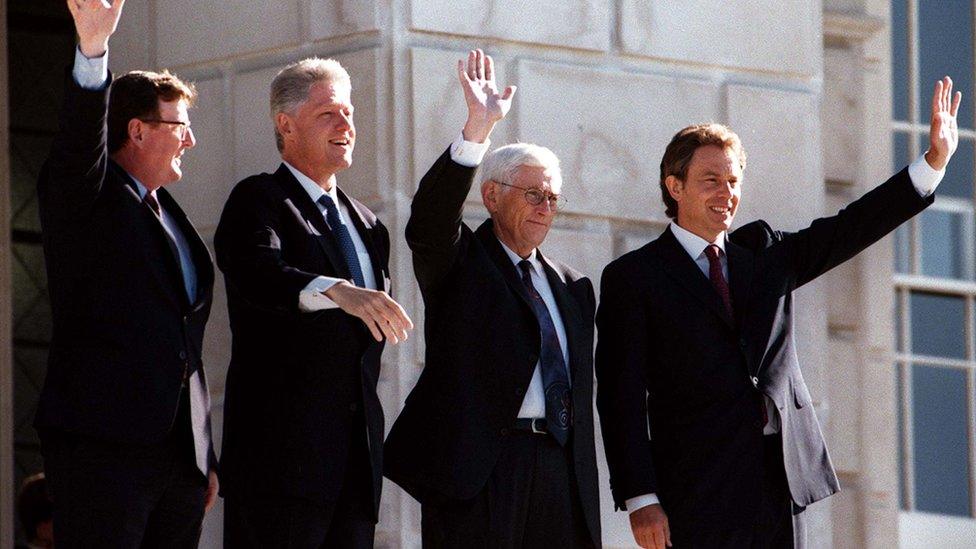
Seamus Mallon was integral to the signing of the 1998 Good Friday peace agreement
Philip Allen and Damien Trainor - one a Protestant and one a Roman Catholic - died in Poyntzpass, County Armagh, in March 1998.
Both politicians said their presence there together was a sign of solidarity against the men of violence.
He served as the deputy leader of the SDLP, when John Hume was leader of the party. Both men are widely regarded as playing a key role in the forging of the 1998 Good Friday peace agreement, which established power-sharing government in Northern Ireland and brought an end to decades of violence.
'Man of huge strength'
A statement on behalf of John Hume and his wife Pat, paid warm tribute to their "dear friend".
"Men like Seamus Mallon don't come along too often, we should for grateful for his work in our time and cherish his legacy and preserve his values by never giving up on standing up for what is right, standing tall against prejudice and injustice and standing for making Ireland a country of peace and partnership," the statement said.
"He was a man of huge strength and courage, who stood with John for many years in the fight for justice, peace and reconciliation on this island."
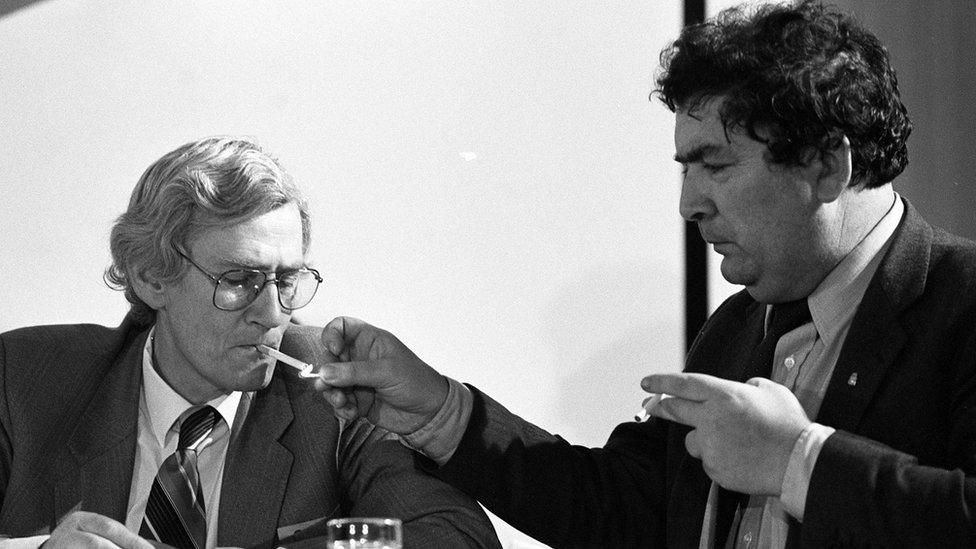
John Hume and Seamus Mallon worked together for many years in the SDLP
Mr Mallon is survived by his daughter Órla. His wife Gertrude passed away in October 2016 after a long battle with dementia.
Politicians from across the island of Ireland have been paying tribute to the late deputy first minister, who helped form the SDLP. By 1973, he was a councillor and became the SDLP's deputy leader within five years.
Mr Trimble, his former power-sharing partner, told BBC Radio Ulster that Mr Mallon's legacy was huge.
"He was committed to politics and he was committed to peaceful democratic politics, that was why he was such a good parliamentarian. He was a stubborn man, yes, but at the end of the day he was prepared to make an agreement which we did and we implemented it.
"His legacy will be bound up by the agreement and the institutions and that is something that his family can feel proud of."
'Constant source of guidance'
The SDLP leader Colum Eastwood described Mr Mallon as a "force of nature".
"I joined the SDLP because of people like Seamus Mallon. His absolute opposition to the murder and maiming of our neighbours, his immense work to reform policing and deliver a new Police Service that could command the support of our entire community and his unrelenting commitment to making this a place we can all call home inspired so many young SDLP members," he said.
"Throughout my political life, Seamus was a constant source of guidance, advice and, when needed, some robust critical reflection. His support has been an immense source of personal pride. I hope that I've done him proud in return."
Northern Ireland's First Minister Arlene Foster said she was "very sorry" to learn of Mr Mallon's passing.
Allow X content?
This article contains content provided by X. We ask for your permission before anything is loaded, as they may be using cookies and other technologies. You may want to read X’s cookie policy, external and privacy policy, external before accepting. To view this content choose ‘accept and continue’.
Deputy First Minister Michelle O'Neill said Mr Mallon was "a significant political figure who made a huge contribution to the politics of peace and the Good Friday Agreement".
Former US president Bill Clinton described Mr Mallon as "a hero of the peace process and a profoundly good man".
"A teacher in practice and in heart, the lessons of his life and power of his example are as important today as ever.
"I will always be grateful for the opportunity to have known and worked closely with him."
Former PM Tony Blair said Mr Mallon was "one of the most important architects of peace in Northern Ireland".
"Brave, blunt, often prepared to swim against the tide if he felt it right, he was someone deeply respected and admired across the troubled landscape of Irish politics," he tweeted.
Taoiseach (Irish PM) Leo Varadkar said history would remember Mr Mallon as a "committed peace builder and a tireless champion of an inclusive Ireland".
'Extraordinary contribution'
"He always opposed sectarianism and discrimination in any form. When others in his community advocated violence, Seamus had an unswerving commitment to constitutional nationalism. He was a peacemaker who put us on the path to reconciliation."
The Speaker of the Northern Ireland Assembly Alex Maskey described him as a "towering figure" and said he would be liaising with the parties to arrange for the assembly to "pay its respects to him for his public service as a former deputy first minister".
Tánaiste (Irish deputy PM) Simon Coveney said Mr Mallon had made an "extraordinary contribution to politics and people" on the island of Ireland.
The Prime Minister Boris Johnson said he wanted to express his condolences to Seamus Mallon's family.
"Seamus Mallon made an extraordinary contribution to democracy and peace in Northern Ireland," he said.
The Secretary of State Julian Smith also paid tribute, saying the late SDLP politician's "leadership with David Trimble of the first executive in 1999 set Northern Ireland on a new democratic course".
Allow X content?
This article contains content provided by X. We ask for your permission before anything is loaded, as they may be using cookies and other technologies. You may want to read X’s cookie policy, external and privacy policy, external before accepting. To view this content choose ‘accept and continue’.
Former communications director for Downing Street during the Good Friday Agreement negotiations, Alastair Campbell said Mr Mallon had been "one of the great guys" in the peace process.
"I think Seamus Mallon will have a huge legacy, he was a presence and a great provider of wisdom," he told BBC News NI.
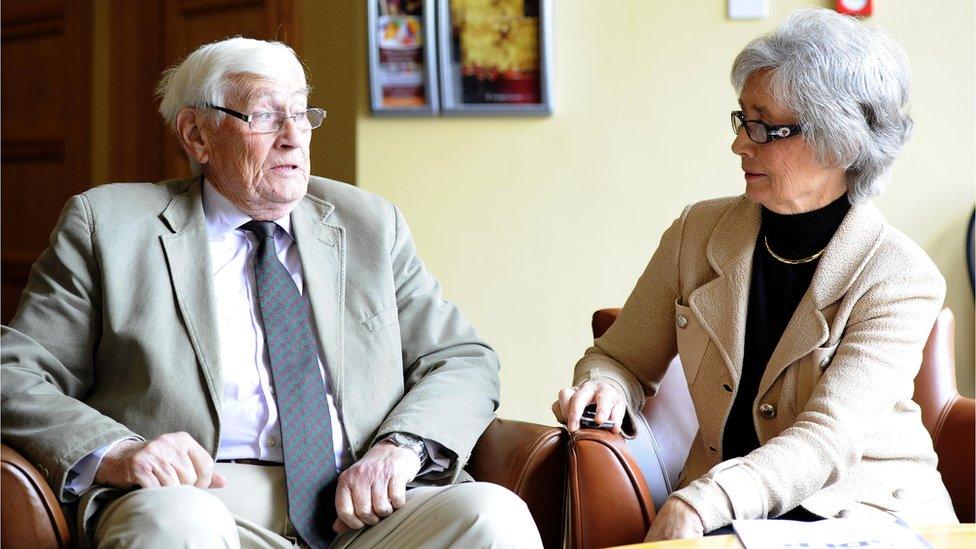
Seamus Mallon with Brid Rodgers, who replaced him as deputy leader of the SDLP
Former Taoiseach (Irish PM) Bertie Ahern, said he had visited Mr Mallon last week.
'Man of hope'
"He was clearly weakened but still mentally very alert and well able to chat.
"I always remember the huge amount of work that he did on the policing bill after the Patten Report - he was the one more than anybody who worked on that legislation."
Former SDLP MP for West Belfast Joe Hendron described Mr Mallon as a "giant of a politician".
"He was a person who had a profound respect for the unionist community and the nationalist community and I would say that particular point would have affected all his politics," he said.
The head of the Catholic Church in Ireland, Archbishop Eamon Martin, also expressed his condolences.
"To his dying day Seamus Mallon remained a man of hope for a brighter future - a shared and respectful future where we all experience a sense of belonging," he said.
- Published24 January 2020
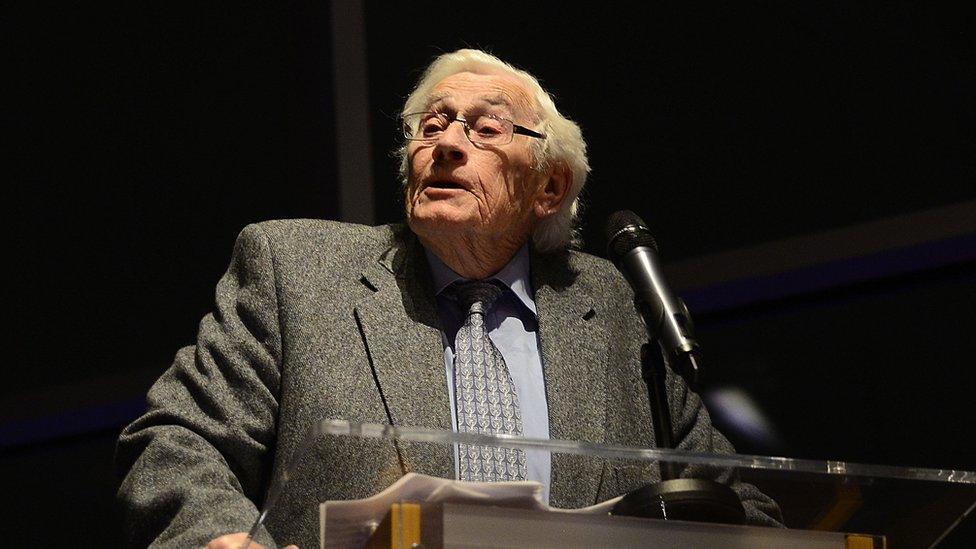
- Published24 January 2020
